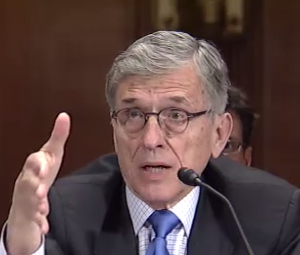During a speech in Washington Friday, Federal Communications Commission Chairman Tom Wheeler outlined the agency’s aggressive approach to broadband regulation, and touched on a number of headlining FCC issues in recent weeks including net neutrality, the expansion of the Lifeline program to include Internet, and the agency’s new spectrum auction rules announced Thursday.
“Today, the largest taxi company in the country doesn’t own any vehicles, the largest overnight lodging company doesn’t own any hotels, and the fastest growing of the top-10 retailers has no showrooms,” Wheeler said in his prepared remarks at the Brookings Institution. “What they do have is easy access to a broadband network, which enables them to assemble resources in new ways, present them to the public in new ways, and define an economic future that is task-based as opposed to the production-based economy of the pre-broadband era.”
“So here’s the punchline. It’s pedal to the metal on broadband policy — for both consumers and competitors.”
Last week the FCC expanded its Lifeline, or “Obamaphone,” program, to include broadband in the list of services low-income Americans can purchase with a monthly subsidy from the government — a move Wheeler described as essential in guaranteeing Internet connectivity for all.
“Simply put, broadband should be available to everyone everywhere,” Wheeler said, adding the agency’s vote last week will help “refocus Lifeline from voice service to broadband.”
The chairman repeated his assurance the agency’s new net neutrality regulations, effective as of June 12 and upheld by a federal court earlier this month, will help the FCC ensure broadband competition.
“I keep describing this oversight as a ‘referee on the field who can throw the flag,'” Wheeler said. “In our implementation, I plan to adhere to the wisdom that the best referees do not make themselves part of the game unnecessarily.”
“We will not micromanage networks as was done in the pre-broadband days. This means no retail rate regulation, no network unbundling, and no tariffs. In short, no ‘utility-style regulation.'”
The speech comes one day after Wheeler released his revised rules for the commission’s spectrum auction slated for next year, when the commission will open up bidding on airwaves reallocated from government agencies and bought back from broadcasters to resell to wireless providers.
Those airwaves will go to fuel the burgeoning demand for bandwidth in the U.S. necessary to satisfy mobile connectivity for applications like streaming video, music, GPS navigation and other services — bandwidth wireless providers are in heated competition to seize and expand their networks.
“Everything in the world is economic,” Wheeler said. “People who say, ‘I’ll never part with my spectrum’ — if you can help them see the economic value in parting with that, or having a different approach to their use of the spectrum, it often can let the scales fall from their eyes. And that’s what auctions do, and that’s what the incentive auction is doing.”
Two of those networks — AT&T and T-Mobile — came to media blows over the auction this week regarding a petition from T-Mobile to the FCC requesting the agency block AT&T’s purchase of low-band spectrum in rural parts of Kentucky, Ohio and West Virginia — markets where T-Mobile is the smallest competitor, and where the company argues AT&T, as one of the two largest providers in the U.S., should be barred from purchasing more spectrum.
The request is the latest battleground in T-Mobile’s ongoing campaign to persuade the FCC to set aside more spectrum in next year’s auction — an increase from 30 to 40 MHz — exclusively for bids by smaller carriers, barring AT&T and Verizon from participating.
A senior FCC official told reporters on a conference call Thursday Wheeler decided to deny the request.
“The recommendation from the chairman is to keep the reserve where it is — in other words, to deny T-Mobile’s request to increase the reserve,” the official said. “The chairman has spoken about how the incentive auction and the mobile spectrum holdings was a balancing of factors, and he continues to believe it’s a very well-balanced approach.”
“The reserve is a big gain for competitive carriers, and 30 MHz is a big step forward for competition,” the official said.
The new rules take direct aim at a tactic used by DISH Network during the last auction, when the satellite provider received $3 billion in small business subsidies, known as “designated entity” subsidies, by bidding through two shell companies in which DISH owns a controlling stake.
Such “joint-bidding agreements” will be banned under the new rules, as will multiple applications from companies with the same controlling interest and with a shared strategy to purchase spectrum.
Frequently at odds with the chairman over the issues discussed Friday are the FCC’s two Republican Commissioners, Ajit Pai and Michael O’Rielly, both of whom made statements Thursday about those issues.
“I am deeply disappointed that Chairman Wheeler is proposing yet more loopholes to allow corporate giants to abuse the designated entity program,” Pai said in a statement Thursday. “For instance, those benefiting from taxpayer-funded discounts when buying spectrum should use that spectrum for the public’s benefit — not just lease most or all of it to large carriers like AT&T and Verizon.”
“Loopholes like this might be good for big business and small arbitrageurs, but they certainly aren’t in the interest of the American people, and they do nothing to further wireless competition.”
“From a regulator’s perspective, it is important to recognize the difference between a necessity or a human right, and goods such as access to the Internet,” O’Rielly said during a speech to the Internet Innovation Alliance Thursday in reference to reforms like Lifeline. “Avoiding the use of such rhetorical traps is wise.”

